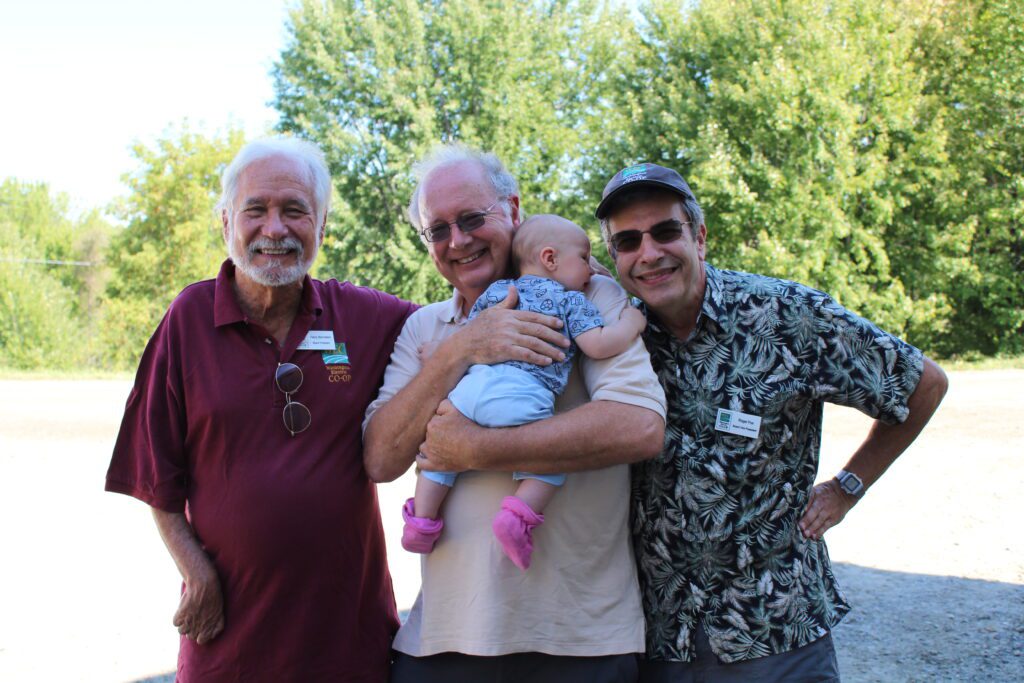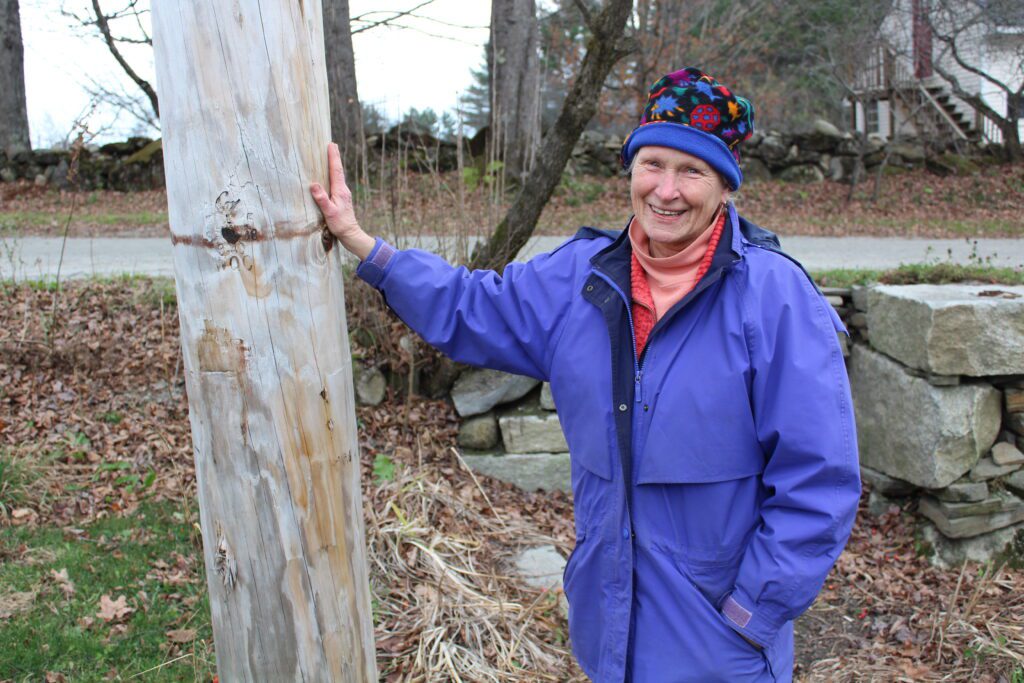Outgoing Directors Barry Bernstein and Annie Reed on the importance of upholding the founding values of the Co-op now and into the future
Barry Bernstein and Annie Reed are both stepping off WEC’s Board of Directors when their terms conclude in 2022. Bernstein was WEC’s President for many years, Reed served as Secretary, and they have a combined 35-plus years of Board service. But the impact of these Directors on the history and future of the Co-op is more significant than even these facts indicate.
As they considered their years of service, Bernstein and Reed talked about caring for their community and caring for the environment. It’s clear to them that environmental and community health are the same. This value precedes them at WEC: it started, they agree, with WEC’s founders’ decision to form an electric cooperative – a not for profit with member-owners active in its democratic governance. The founding members in 1939 were homesteaders and farmers who worked the land and milked cows in the dark. Bernstein, whose involvement in WEC stemmed from concern over the Co-op’s governance in the 1970s, pointed to the founders’ bravery. “They were called socialists and communists because they were stepping out of the status quo to do something different” and bring electricity to rural Vermont on their own, he said, bypassing the corporate utilities that saw no profit motive in serving the back roads. “Those people took a big risk. And we’re at a time now when we’ll have to take risks, think out of the box, get out of our comfort zones.”
Bernstein and Reed joined WEC to improve environmental and community health, and they are leaving in a time of profound climate reckoning, just a few years after WEC was the first utility in Vermont to adopt a climate change statement. Environmental and community health is the legacy, and the trajectory, they hope to leave.

Bernstein, of Calais, a member for more than 50 years, became involved with WEC in 1973, as part of a group of members concerned about the direction of the Co-op in the age of nuclear power and the OPEC oil embargo. Faced with leadership he perceived as “a closed shop, contrary from our group’s opinion of the whole basis of the Co-op’s origin,” Bernstein and fellow organized members used the Co-op’s democratic process to shift WEC’s direction. Between the 1970s and 1990, WEC’s emphasis on efficiency and renewable energy waxed and waned as majority interests shifted back and forth. Over many years of organizing and campaigning, WEC elected a majority of directors who wanted their local power to come from less environmentally destructive sources.
Bernstein himself joined the Board in 1998 in order to have a more direct role setting policy. Four years later, WEC divested its shares in the Vermont Yankee nuclear plant. Three years after that, in 2005, WEC opened the landfill-gas-to-energy plant at Coventry landfill, which captures landfill methane to provide, currently, more than two-thirds of the Co-op’s power. “What we wanted was stable, long term, in-state, renewable power. It was one of the best economic decisions the Board made, because it’s one of our least expensive sources of power,” he said. WEC was the first utility in Vermont to provide power from 100 percent renewable sources.

Reed has lived on Hollister Hill in Marshfield since 1978, but she lived off the grid before she finally installed a meter – she needed to power her laptop to complete her Master’s degree in environmental science. Reed joined the Board 12 years ago at the suggestion of a friend. “I did it because it was fun,” she explained: she liked the crash course in utility and cooperative operations; she liked the problem-solving and visioning that happened in Board meetings. The other reason she joined, she said, was “really about the way Washington Electric participates in the community here.” For example, WEC’s Community Fund design resonated with her: members can donate the money returned to them in the form of capital credits, and the fund distributes grants to small nonprofits in WEC’s service area.
Bernstein described Reed as “a Board member who actually gets her hands in the dirt,” whether it’s planting pollinator gardens, or continually bringing Board conversation back to focus on how each decision affects the membership. Her voice demonstrates why representation is important in policy making: well-intentioned “solutions” can have unintended consequences if they’re implemented top-down.
“When the PUC [Public Utilities Commission] said to the electric industry, ‘you have to start offering incentives for people to cut their fossil fuel use,’ we had the choice of giving subsidies to people who put up solar panels, heat pumps, solar hot water. All of these things were really only available to people who had the money to pay for them,” said Reed. “Our Board said, ‘Weatherization has to come first. Give the incentives to people who don’t have the money, not incentives for people who already have a lot of money.’” As a result, WEC designed its Button Up program to focus on weatherization, and has built partnerships with Capstone, Efficiency Vermont, and others to further reduce economic barriers for its membership.
Bernstein has witnessed an interesting twist develop in WEC’s positions on energy efficiency and beneficial electrification. For years, WEC’s rate structure incentivized using as little electricity as possible. That’s a counterintuitive stance for an entity whose survival hinges on selling electricity – even a cooperative. But recently, WEC adjusted its rate structure to encourage members to use WEC electricity for more than just lights, but also heating and driving. WEC’s 100 percent renewable electricity, almost all locally generated, has far less environmental impact than pumping, refining, shipping, and burning fossil fuel. That increases the impact when members use it, Bernstein said. “We had all the right ingredients to address climate change by encouraging our members to switch from fossil fuel to renewable electricity to meet their needs.”
Bernstein has made it clear it’s not that he’s in favor of buying new stuff in general. Instead, he’s strongly in favor of replacing old, inefficient devices with electric ones. And, he said, we all need to be informed, restrained consumers. Beware of greenwashing. “I’ll give an example,” he said. “We’ve supported net metering as a Co-op. But when people put up an intermittent resource such as a solar panel, and that in effect replaces 24/7 renewable energy the Co-op has already invested in, is that a wise decision?”
Part of his reasoning is because the high price the Co-op is required to pay for net metered power contributes to rate increases that affect members who do not net meter, and are, generally speaking, less affluent than members who can afford to install solar.
The other reason is the extractive cost of the panels themselves. “Everything has an environmental cost. Solar panels come from China. Those workers are not guaranteed fair wages nor good working environments. They produce most of the power they use to build things with coal: China burns seven to eight times more coal than we do in the US,” he pointed out. Yes, solar panels are an important tool to offset fossil fuel generated power. But when they’re installed in WEC territory, are they really green? Or redundant, and contributing to inequity? Bernstein said it’s important for incoming Board members to have the ability to think about energy in a nuanced way, without setting hard lines around what’s good and bad, and to stand with integrity.
Bernstein said it’s important for incoming Board members to have the ability to think about energy in a nuanced way, without setting hard lines around what’s good and bad, and to stand with integrity.
“People are really conscious that our actions affect the climate, and we see it’s deteriorating. What I am seeing is people are more and more interested in how to conserve energy, how to get off of fossil fuels,” said Reed. On May 30, 2018, WEC’s Board formally adopted the first climate change statement made by a Vermont utility. In it, WEC called on the electric cooperative associations to which it belongs to take meaningful action, including legislative advocacy, to reduce the industry’s contributions to global warming.
Reed also sees the statement as a way for WEC to hold itself accountable. While leadership may change, the climate change statement does not. It helps the Board consider “in everything that we do, how our actions impact the earth and the membership. It’s felt like an anchor, something we could sink our teeth into and mobilize around,” she explained. (WEC’s Climate Change Statement is printed in full below).
While Reed and Bernstein will no longer directly shape Co-op policy, the statement is a way to ensure something particular about WEC continues. Bernstein likes to talk about the Cooperative Difference – what co-ops offer their communities that for-profits do not – but he also sees WEC as a cooperative unique among cooperatives.
“There are over 900 rural electric co-ops in the US,” he said. “One of the things that sets Washington Electric apart is that the Board made a commitment in the 1990s to speak out on issues on behalf of both our members and the ratepayers of Vermont. We took as our responsibility to be a voice, to be the yardstick for measurement, on things we thought were critical to the discussion on energy policy and the environment, and also, to show by example.” He described helping members practice energy efficiency, investing in renewable power, advocating for more representational interests on the board of VELCO, the statewide transmission utility owned by distribution utilities.
Bernstein and Reed see that work as the direct legacy of WEC’s founders. “It’s really important that WEC stay grounded in the values that started the Co-op, and which are reinforced by many of the things Annie and I and others have done,” Bernstein said. “We’re not going anywhere – we’re still getting electricity from the Co-op! We’re just getting off the Board, and we expect new leaders to come on and carry on that tradition,” he continued. “It’s not about us, it’s about our grandchildren. Annie, I’m very grateful to have had you on the Board.”
“Thank you, Barry,” responded Reed. “You’re one of the reasons I’ve loved it so much.”
Washington Electric Co-op’s Climate Change Statement
Adopted by the Board of Directors May 30, 2018
The WEC Board of Directors acknowledges that rapid global warming and associated climate instability are real, and are significantly attributable to human activities. We are concerned that global warming presents great risk of serious and negative economic, environmental and health ramifications to humans, along with challenges to the continued existence of numerous other forms of life on this planet. WEC urges NRECA [National Rural Electric Cooperative Association] and NEAEC [Northeast Association of Electric Cooperatives] to support meaningful efforts on the part of the electricity sector to address global warming, including legislation at the federal, state, and local levels to mitigate the harmful effects of climate change. An effective response must also address financial impacts incurred by cooperatives burdened with legacy power supply commitments.
